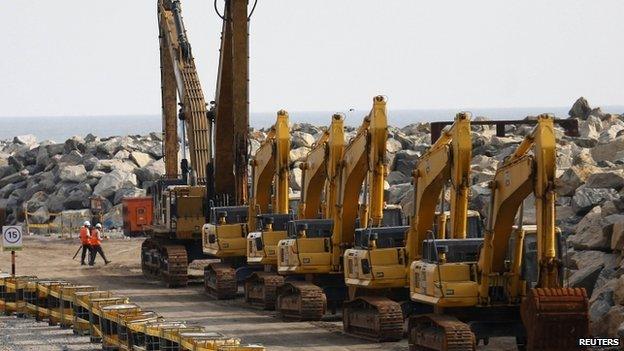China media: Sri Lanka investment
- Published

Work has been suspended at the construction site of the China-backed "Colombo Port City" project
Papers analyse Sri Lanka's decision to suspend a Chinese-funded construction project.
According to reports, newly-elected Sri Lankan President Maithripala Sirisena has decided to revisit some deals signed with China by his predecessor Mahinda Rajapaksa.
The suspension of the port city project in Colombo and subsequent protests by Sri Lankan workers have gained wide attention in Chinese papers, external.
Mr Sirisena's government said that the project was launched "without relevant approvals from concerned institutions".
Some papers report that Sri Lankan workers are very angry over the decision, while other news portals, external quote foreign media reports saying that the incident is a test of Beijing's "ambitious overseas ventures".
The Xinhua News Agency, external highlights Mr Rajapaksa's criticism of the suspension.
"Halting of development projects means that the Sri Lankan workers and engineers working on them will lose their jobs and thereby the cash flowing to villagers will stop," state media quote him as saying.
The Colombo port project is part of Beijing's Maritime Silk Road initiative, which is aimed at connecting China with the Indian Ocean nations and the larger Asia-Pacific region.
A commentary in the Haiwai Net, external, a news portal of the People's Daily newspaper, stresses that China views Sri Lanka as one of the important "components" in the country's Maritime Silk Road project.
'Pro-India president'
Observers in international media outlets say the initiative poses a direct challenge to India. Chinese papers, however, dismiss such views, assuring that the project will benefit every country in the region.
"The authorities cite regulations and environment issues as reasons for the suspension… but this is only an excuse," says the Haiwai Net article.
The commentary notes that the new Sri Lankan president is "very pro-India" and suspects Colombo may have been "facing pressure from Delhi".
However, it highlights that India is unlikely to have the economic capacity needed to help Sri Lanka, and predicts that Colombo will "still depend on Beijing for infrastructure investment in the long term".
Turning to domestic news, papers assess "judicial fairness" after Chief Justice of the Supreme People's Court Zhou Qiang urged the courts to learn from wrongful convictions.
His comments come months after a high-profile case involving a wrongly-executed 18-year-old sparked a debate.
An article in the Global Times, external points out that it is "rare" for judicial authorities to use "such strong words".
The admission shows that the authorities "have been reflecting on their flaws" and "proactively responding" to the public's doubts about judicial fairness in China, it says.
Praising the judicial departments for being "courageous", the Beijing News, external urges the authorities to put in more effort to improve the system.
Echoing similar views, the Beijing Times, external says the admission of fault is "a first step". It urges judicial workers to "carry out their responsibilities according to the law".
BBC Monitoring, external reports and analyses news from TV, radio, web and print media around the world. You can follow BBC Monitoring on Twitter , externaland Facebook, external.